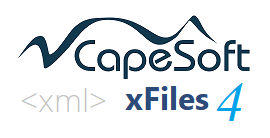Introduction
CapeSoft xFiles is a collection of classes written in
Clarion to deal with XML formatted text.It includes both a Stream-based
parser, and also a Tree-based parser. Stream-based parsers are optimized
for speed, Tree-based parsers are slower, but allow extra functionality.
By including both, xFiles allows you to choose the correct parser for the
correct situation.
xFiles is tightly integrated to Clarion data structures, meaning that it
understands Tables (Files), Views, Queues and Groups. Creating XML from
these structures, or consuming XML into these structures is very
straight-forward. Nested structures (Groups and Queues inside other Groups
and Queues) are supported, as are Views with multiple nested Joins. (Views
are Read Only, you can create XML from a View, but you don't read XML into
a VIEW).
XML is used in many different places as a way to exchange data between
programs. Some of the more common structures (SOAP for web services, and
OpenSpreadsheet XML for Excel Spreadsheets) are also included.
xFiles is primarily used by writing code in embeds, but it is also
integrated into other tools, like NetTalk (for creating SOAP-based Web
Services), SendTo (for creating spreadsheet XML files) and so on.
xFiles originally started with a streaming parser, which emphasizes
performance. xFiles 4 adds a tree parser which allows a much finer control
over the content of the XML. In this documentation it's important to know
when a section applies to the streaming parser, the tree parser, or both.
Webinar
Online Code Generator
xFiles makes possible an
online Clarion Code generator for XML loading and
saving. This tool inspects some same XML that you provide, and then
generates appropriate Clarion structures, and xFiles code, for creating or
consuming that XML. This greatly reduces the time it takes to use XML in
your program.
Requirements
Features
- Create XML directly from Clarion structures.
- Load XML directly into Clarion structures.
- Read and Write XML from Disk files, strings, or StringTheory
objects.
- Manipulate the XML in tree form before loading or saving.
- Ships as all-source code, no DLL's or black boxes
- Create Open Document Spreadsheets as XML files. Can be opened in
Open Office, Libre Office, or Excel.
Overview of xFiles 4 New Features
This section serves as a quick primer for those
programmers used to xFiles 3 (and earlier). It highlights important new
features, and refers to documentation on those features.
- Adds a new Tree-Based parser (xFilesTree), while preserving the
original Streaming based parser (xFilesStream) [1]
- xFilesTree supports creating nested XML, to match JOINS in VIEWS.
- xFilesStream class has new LOAD and SAVE methods that support
STRINGTHEORY objects (in addition to plain strings, and disk files.)
- xFilesStream class has support for Extended Name Attributes
(attribute)
- xFilesStream class has simplified use of SetAsAttribute usage.
Note 1: the xFileXML class
has been renamed to xFilesStream. However the old name, xFileXML has been
kept for backwards compatibility, and it will still work. For new work
don't use that name though.
Upgrading
xFiles 4 is a drop-in upgrade to xFiles 3. Apart from
adding the StringTheory and Reflection global extensions in your
application, no other changes are required.
Upgrade pricing is available - see
below.
Compatible With
| Clarion 8 |
Yes |
| Clarion 9 / 9.1 |
Yes |
| Clarion 10 |
Yes |
| Clarion 11/ 11.1 |
Yes |
| Clarion Templates |
Yes |
| ABC Templates |
Yes |
| AnyScreen |
Yes |
| Hand-Coded Projects |
Yes |
| Local Mode |
Yes |
| DLL Mode |
Yes |
| Multi DLL |
Yes |
Documentation & Support
Documentation for the product is available
here.
Go
here
for further support.
Cost
Refund Policy
CapeSoft believes that if you aren't satisfied with
our products, we would like them back - and we will refund you the money.
This allows you to purchase our products with confidence. You can read our
full refund policy
here.

